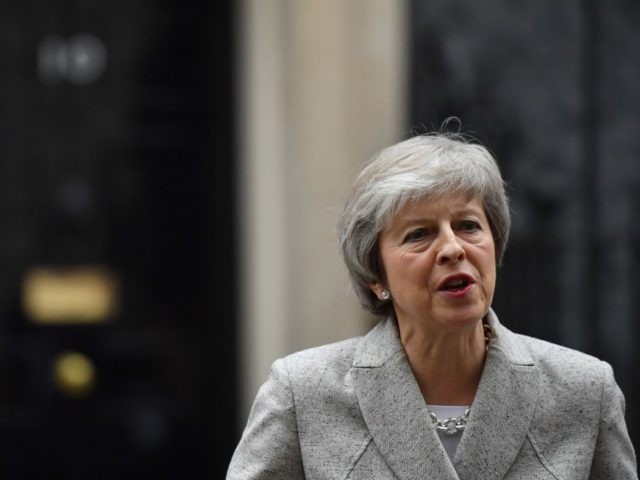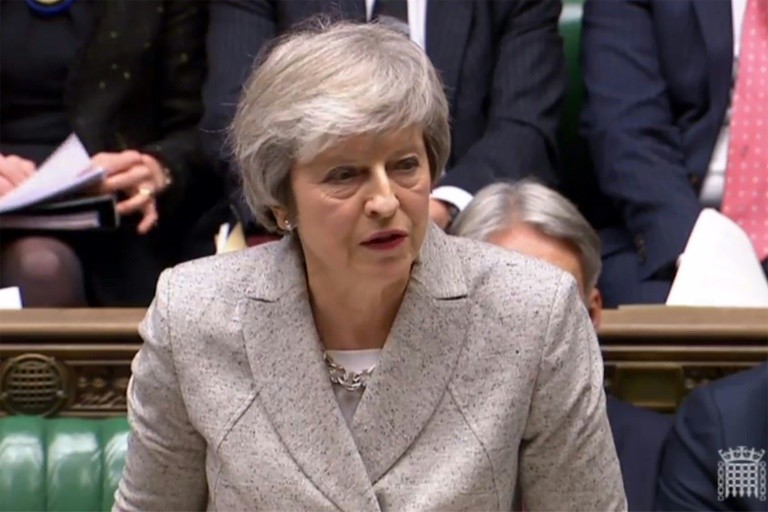British Prime Minister addressed the nation Thursday afternoon, shortly after news broke of a draft political agreement on Brexit having been struck with the European Union, claiming her deal was the right one for Britain — but even as she spoke questions were being raised over what that deal would mean for the United Kingdom.
Telling the news cameras that she had tasked British negotiators to work overnight to get an agreement on the draft document, Theresa May said: “this is the right deal for the UK. It delivers on the vote of the referendum, it brings back control of our borders, our money, and our laws, and it does so while protecting jobs, protecting our security, and protecting the integrity of the United Kingdom.”
Update 1520: Theresa May addresses House of Commons
Following her brief speech outside the Prime Minister’s official residence at Downing Street, Theresa May made a longer address to the House of Commons Thursday afternoon and defended both her record and her deal, dismissing criticism levelled at it.
The Prime Minister confirmed Britain would be prevented from launching trade deals for years after Brexit, but would at least be able to negotiate them ready for such a time when the UK was actually able to leave the EU and the so-called implementation period. She said:
“Crucially, the text we have agreed has an explicit reference to the development of an independent trade policy by the UK beyond this partnership with the EU. So we’d have the ability to sign new trade deals with other countries, and capitalise on the opportunities in the fastest growing economies around the world.
“We’ll be able to get on with this, negotiating deals during the implementation period, and putting them in place immediately afterwards.”
On the matter of fishing — the section of the draft agreement dealing with Britain’s waters was one of the first to circulate on social media Thursday morning — May insisted that she’d got a good deal for fisheries and that they wouldn’t be bartered away.
The Prime Minister said: “the deal will mean leaving the common agricultural policy and the common fisheries policy… we will become an independent coastal state, with control over our waters, so our fishermen get a fairer share of the fish in our waters. We have firmly rejected a link between access to our waters, and access to markets.
“The fisheries agreement is not something we will be trading off against any other priority. We are clear that we will negotiate access and quotas on an annual basis, as do other independent coastal states like Norway and Ireland.”
The leader of Britain’s Labour opposition Jeremy Corbyn had a chance to deliver a response to the Prime Minister’s statement in the house, and criticising the ambiguous nature of the Prime Minister’s deal said: “this empty document could have been written two years ago. It is peppered with phrases such as ‘the parties will look at, the parties will explore’.
“What on earth has the government been doing for the last two years? They’ve managed less than one page a month since the referendum.”
Read the original story below:
News of the draft agreement came with European Council president Donald Tusk announcing the document Thursday morning, writing on micro-blogging platform Twitter; “I have just sent to EU27 a draft Political Declaration on the Future Relationship between EU and UK.
“The Commission President has informed me that it has been agreed at negotiators’ level and agreed in principle at political level, subject to the endorsement of the Leaders.”
But as the paper was shared on social media, line-by-line analysis of the document by Eurosceptic academic Dr Lee Rotherham questioned the benefit to the United Kingdom the agreement would bring.
Noting that the draft paper requires “deep regulatory and customs cooperation, underpinned by provisions ensuring a level playing field for open and fair competition”, the academic wrote “It’s hard to look at para 23 and not conclude that it’s a customs union. It’s pretty well a dictionary definition.” Dr Rotherham said according to these paragraphs in the deal, the UK will have to align its regulation to the European Union, what he called a “fax democracy”.
Britain being “governed by fax” by the European Union is taken to mean new laws and regulations being sent to London arbitrarily, without means to challenge or amend and was a threat against Brexit made by former Prime Minister David Cameron in 2012, before he gave Britain a vote on whether to leave the European Union.
The Reuters news agency reported further bad news from the Prime Minister’s deal Thursday, an analysis of the text showed the government’s negotiators had secured no improvements to the proposed future relationship regarding financial services with the EU. As things stand, British banks would only be granted access to the European market if the UK’s rules and regulations remain closely aligned, another example of the EU preventing Britain from forging its own destiny after Brexit.
This story is developing and more follows


COMMENTS
Please let us know if you're having issues with commenting.